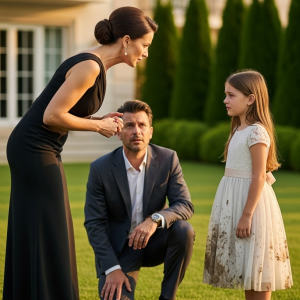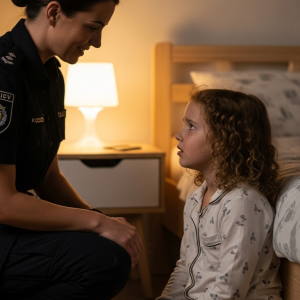At seventy-two, Minerva’s life had settled into a rhythm of quiet grace. Her small, sunlit apartment was a museum of a life well-lived, each photograph on the mantelpiece a testament to a love that had shaped her. There was her husband, George, his warm, crinkling smile still a palpable presence a decade after his passing. And there was her daughter, Clara, lost to a sudden illness, her bright, laughing eyes a source of both sweet memory and enduring ache.
After so much loss, Minerva had poured all the love that remained into her grandson, Tyler. He was Clara’s boy, a living piece of the daughter she had lost. He had his mother’s eyes and his grandfather’s charm, a combination that made it impossible for her to deny him anything. He was, she believed, the steady young man who had stepped up to help his aging grandmother navigate the complexities of the modern world.
The first Thursday of every month was the day of their ritual. Minerva would walk to the bank, her steps measured and sure, and withdraw the $800 for her rent from her modest pension. Back in her apartment, she would sit at her small kitchen table, smooth out the crisp bills, and place them inside a clean, white envelope. On the front, she would write in her neat, elegant script: For Mr. Henderson.
When Tyler arrived that afternoon, his smile was as bright as always. “Hey, Gram,” he’d say, kissing her on the cheek. “You ready for me?” He was a handsome young man, always dressed in stylish clothes that seemed a bit too expensive for his job as a “freelance marketing consultant,” but she never questioned it. She was just proud of him.
“Of course, dear,” she would say, handing him the envelope. “Now, are you sure this isn’t a bother? I could learn how to do the online banking…”
“Nonsense, Gram,” he’d reply, patting her hand with a practiced reassurance. “It’s no trouble at all. It gives me an excuse to come see my favorite girl. Mr. Henderson gets his money, and I get one of your famous lemon cookies. Everybody wins.”
She would watch him place the envelope carefully into his inside jacket pocket, her heart swelling with a love so pure it was almost painful. She trusted him completely, utterly. This monthly transaction was more than just paying rent; it was a reaffirmation of their bond, a testament to the family she had left. She saw his care as a continuation of the love she had lost, and in that, she found her peace.
The knock on the door came on a Tuesday afternoon. It was sharp and official, lacking the friendly rhythm of a neighbor’s visit. When Minerva opened it, she was surprised to see her landlord, Mr. Henderson, a kind, balding man who usually kept to himself. His face, normally pleasant, was etched with a deep, uncomfortable worry.
“Minerva,” he began, his voice hesitant. “I’m so sorry to bother you, but we need to talk.”
“Of course, Robert,” she said, stepping aside to let him in. “Is everything alright with the plumbing? I thought I heard a rattle in the pipes last night.”
“No, the plumbing is fine,” he said, avoiding her eyes as he stood awkwardly in her small entryway. “It’s… it’s about the rent.”
Minerva smiled, a little confused. “Oh, did Tyler not drop it off yet this month? He can be a bit forgetful, that boy. I gave it to him last Thursday, as usual.”
Mr. Henderson finally met her gaze, and his expression was one of profound pity. “Minerva, it’s not just this month. The rent hasn’t been paid for the last four months. We’ve sent letters, but…”
The world seemed to tilt beneath Minerva’s feet. The cheerful ticking of the grandfather clock in the corner suddenly sounded deafening. “Four months? Robert, that’s impossible. I have given Tyler the money every single month, on the first Thursday, without fail. There must be some mistake with your bank.”
“I wish there were,” he said softly. “We’ve checked our records thoroughly. No payments have been received from you or on your behalf since April. The management company… Minerva, they’ve started eviction proceedings. The official notice will arrive tomorrow.”
Eviction. The word was a foreign, brutal sound in her quiet, orderly world. It didn’t make sense. Her mind raced, trying to find a logical explanation. Had Tyler been robbed? Had he lost the money? But for four consecutive months? The confident certainty she had lived with for years began to crumble, replaced by a horrifying, creeping dread.
“I… I will call him right now,” she stammered, her hands trembling as she reached for the phone. “We will sort this out. It’s a misunderstanding, Robert. It has to be.”
But as she dialed Tyler’s number and it went straight to voicemail for the third time, the cold, heavy stone of betrayal began to settle in her stomach. Mr. Henderson left, his face a mask of sympathy, and Minerva was left alone in the sudden, crushing silence of her apartment, the eviction notice a guillotine waiting to fall.
Two days later, Minerva stood on the sidewalk, a single suitcase at her feet, and watched as a locksmith changed the locks on the door to her home. Everything she owned, every photograph, every piece of furniture that held a memory, was now on the other side of a door she could no longer open. Tyler was unreachable, his phone still off. Her messages went unread.
With nowhere else to go, she found her way to a city shelter. The building was clean and orderly, but it smelled of disinfectant and quiet desperation. She was assigned a cot in a large, dormitory-style room, separated from the others by thin, temporary dividers. The humility of it was a physical blow. She, Minerva, who had always paid her bills on time, who had prided herself on her independence, was now dependent on the charity of strangers.
That first night was the longest of her life. The blanket was thin and scratchy, and the room was filled with the sounds of a dozen private sorrows—a quiet sob from a nearby cot, a man’s hacking cough, the restless shuffling of people who had nowhere else to be. She lay awake, staring at the stained ceiling tiles, and the full weight of her grandson’s betrayal crashed down on her.
It wasn’t just the money. It was the trust. It was the love she had poured into him, a love he had taken and discarded as easily as a crumpled receipt. Every shared cookie, every warm hug, every “I love you, Gram” now felt like a carefully crafted lie. He had looked her in the eye, month after month, and had taken the money that kept a roof over her head, and had felt nothing.
Just as despair threatened to consume her, the elderly woman on the cot next to her stirred. She was a frail woman with kind, weary eyes. “First night’s the hardest, dear,” she whispered, her voice raspy. “It feels like the end of the world. But the sun still comes up tomorrow. You just have to be there to see it.”
The simple, unasked-for kindness from this stranger was a tiny flicker of light in her vast darkness. In that moment, Minerva made a choice. She could let this break her, or she could let it forge her into something stronger. Trust could be broken, yes. But her dignity, her sense of self—that was hers to protect. She would be there to see the sun come up.
Minerva spent two days at the shelter, the initial shock giving way to a cold, hard resolve. She used the public library computer to research tenant rights and legal aid services. She was no longer a helpless victim; she was a woman gathering her strength for a fight.
On the third morning, her old, pay-as-you-go phone buzzed with a number she didn’t recognize. Hesitantly, she answered.
“Minerva? Is that you?” The voice was young, female, and trembling with an emotion she couldn’t quite place.
“Yes, who is this?”
“It’s… it’s Sarah. Tyler’s wife.”
Minerva’s heart clenched. She had only met the girl a handful of times. Sarah was a quiet, sweet-natured young woman who always seemed to be living in Tyler’s shadow, her eyes often holding a sad, worried look.
“I am so, so sorry,” Sarah’s voice cracked. “I’ve been trying to reach you. I went to your apartment, but the locks were changed. I knew something was wrong. Minerva, I have to talk to you. I think I know what happened to the rent money.”
A sliver of hope, mixed with dread, cut through Minerva’s numbness. “Where is Tyler?” she asked, her voice flat.
“He’s gone,” Sarah said, her voice dropping to a whisper. “He packed a bag two days ago and left. He told me he was going on a ‘business trip,’ but he was lying. I know he was. Can… can we meet? Please? There’s something you need to see.”
They met at a small, quiet café far from Minerva’s old neighborhood. Sarah looked terrible. Her eyes were red-rimmed and swollen, and she wrung her hands nervously on the table. She slid a thick folder across the table toward Minerva.
“I started getting suspicious a few months ago,” Sarah began, her voice low and rushed. “Tyler was always so secretive about his finances. He told me his ‘marketing business’ was taking off, and there was new money coming in. Expensive dinners, a new watch, a weekend trip to a resort… I tried to be happy for him, but it didn’t feel right.”
She took a shaky breath. “Last week, while he was in the shower, I looked at our joint bank statement online. I saw all these strange withdrawals. Large sums of cash, taken out on the first Friday of every month for the last four months. And then… I found these.”
Minerva opened the folder. Inside were credit card statements. They were filled with charges for high-end electronics, designer clothes, and dozens of transactions to online gambling websites. The dates of the biggest losses corresponded perfectly with the weekends after she had given him her rent money.
It was all there, in black and white. Her grandson hadn’t just stolen from her; he had gambled away her security, her home, on the fleeting thrill of a digital poker game.
“I confronted him two days ago,” Sarah continued, tears welling in her eyes. “He told me I was crazy, that it was all business expenses. He lied right to my face. Then he packed his bag and left. I think he was running, Minerva. Not just from me, but from the debts he’s racked up.”
Minerva stared at the papers, the cold, hard proof of her grandson’s betrayal. The pain was immense, a physical weight in her chest. But looking at the distraught young woman in front of her, she felt another emotion rise: a fierce, protective instinct. This girl was a victim too, trapped in the web of Tyler’s lies.
“This is not your fault, Sarah,” Minerva said, her voice regaining its strength. She reached across the table and placed her hand over Sarah’s. “He deceived us both.”
In Sarah’s tear-filled eyes, Minerva saw not a daughter-in-law, but an ally. They were two women who had been betrayed by the same man. And together, they were stronger than he could ever be.
Tyler surfaced three days later. He called Sarah, his voice a cocktail of false bravado and wheedling charm, telling her he had closed a big deal and was coming home. He had no idea that the two women in his life had formed an unbreakable alliance.
Minerva and Sarah were waiting for him in the pristine, modern apartment that Minerva’s rent money had helped furnish. When Tyler walked in, his confident smile faltered as he saw his grandmother sitting on the sofa, her expression calm and unyielding.
“Gram!” he said, his voice straining to sound cheerful. “What a surprise! I was just about to come find you. There was a huge mix-up with the bank…”
“Stop it, Tyler,” Sarah said, her voice sharp and clear, devoid of its usual timidity. She stood beside Minerva, a united front. “We know. We know everything.”
She threw the folder of bank statements onto the coffee table. The papers fanned out, a damning display of his deceit. Tyler’s face went pale. The charming mask fell away, revealing the panicked, weak man underneath.
“That’s… that’s not what it looks like,” he stammered, looking from his wife to his grandmother. “I was going to pay it back! I had a system, I just needed one big win to make it all right.”
“Make it right?” Minerva spoke for the first time, her voice not loud, but carrying an immense weight of sorrow and authority. “You left your grandmother homeless, Tyler. You let me spend nights on a cot in a shelter, wondering what I had done wrong. For what? For a game?”
“I got into trouble, Gram,” he pleaded, his eyes darting around the room, looking for an escape. “I didn’t know what to do! I was going to tell you.”
“No,” Sarah cut in, her voice like ice. “You were going to keep lying. You lied to her, and you lied to me. The lying stops now.”
Minerva stood up slowly, her posture straight and proud. She was no longer the frail, heartbroken woman from the shelter. She looked her grandson in the eye, and he flinched from the quiet power in her gaze.
“I don’t hate you, Tyler,” she said, and the simple, honest statement seemed to wound him more than any shouting could. “I just feel a profound pity for you. You had my love. You had my trust. You had everything that truly matters, and you gambled it all away for nothing.”
She turned to leave, Sarah at her side. “I don’t want your excuses. I just want my home back.”
Faced with the undeniable evidence and the united front of his wife and grandmother, Tyler crumbled. Sarah gave him an ultimatum: he would liquidate his recent expensive purchases, drain his personal savings account, and pay back every cent of the $3,200 he owed Minerva, or she would walk out the door and take the evidence directly to the police to file a report for elder fraud.
Trapped, he agreed. The next day, Minerva and Sarah walked into Mr. Henderson’s office together. Sarah carried an envelope containing the full amount of the back rent, plus late fees. Mr. Henderson, seeing the quiet strength of the two women before him, tore up the eviction notice without a word.
That afternoon, Minerva placed her key in the lock of her own front door. It turned smoothly. Stepping inside, the apartment felt different. It was no longer just a place of memories, but a symbol of her own resilience. She had lost it, and she had fought to get it back.
Sarah helped her unpack her small suitcase, their movements easy and comfortable. They had, in the crucible of betrayal, forged a new and powerful bond.
In the weeks that followed, a new routine was born. Sarah, who had left Tyler for good, would visit Minerva several times a week. They would drink tea, share stories, and tend to the small collection of potted plants on Minerva’s balcony. Sarah’s quiet strength blossomed once she was free from Tyler’s suffocating influence, and Minerva found in her a spirit of honesty and loyalty that she had mistakenly attributed to her grandson.
One sunny afternoon, as they sat in comfortable silence, Minerva looked at the bright, kind young woman beside her. “You know,” Minerva said softly, “George always used to say that family isn’t just about the blood you share. It’s about the people who show up for you when the whole world has walked away.”
Sarah smiled, her eyes glistening. “He sounds like he was a very wise man.”
“He was,” Minerva agreed. “And he would have loved you.”
At seventy-two, Minerva had learned one of life’s hardest and most beautiful lessons. Trust, once broken, can be a difficult thing to rebuild. But love and loyalty can bloom in the most unexpected of places. She had lost a grandson, but she had gained a granddaughter.
Her home was no longer a quiet museum of the past. It was a living, breathing space, filled with a new kind of warmth, the warmth of a family defined not by blood, but by respect, by truth, and by the unshakeable bond of two women who had found strength in each other. She had found her voice again, stood tall, and proved that even after the deepest betrayal, the sun will, indeed, come up tomorrow.




